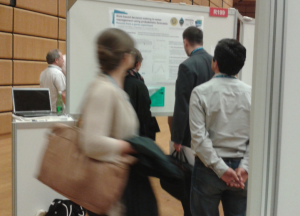HEPEX and early-career scientists
Ensemble hydro-meteorological forecasting @ EGU2014 – Poster session
We hope that HEPEX continues to grow, and for that to happen we obviously need to ensure that early career scientists are encouraged to join and become active members of the HEPEX community.
Being part of a community has benefits to the early-career scientist; it increases the exposure and visibility of their work, and also helps them to understand the wider-context of their research. This, as well as networking with more established scientists put them in a better position when applying for jobs.
Gaining a more active early-career participation and engaging them fully in community activities also has benefits to HEPEX; it will be better able to attract and retain the best researchers within the field and bring fresh ideas to the discipline. This will of course serve to help to advance the science and practice of hydrological ensemble predictions.
We are currently thinking of ways for HEPEX to better engage early-career researchers, and would love to hear any ideas that you might have.
The first initiative that you will notice is a series of ‘Introducing…’ blog posts. Starting on Friday, we will be inviting early-career scientists to introduce themselves to the HEPEX community; then we can all say hi to them at conferences and meetings!
Contact @ HEPEX: Liz Stephens (Early-Career Representative)

September 10, 2014 at 01:33
Maybe you’ll get to this in later posts, but roughly what would you consider “early career”? I suppose there’s lots of gray areas (e.g. people who worked for a while and then went back to get a degree) and we don’t want to exclude anyone (your threshold is 5 years after getting a degree? I’m 6 years, oh well). But do you have some working definition?
September 12, 2014 at 13:16
I’m not sure it matters all that much unless someone decides to fund a HEPEX early-career prize (anyone?!) that we need to decide eligibility for. I think the important thing is about encouraging people to join the HEPEX community.
For reference, the EGU definition is below, and you would still count Tom!
– be in age 35* or younger.
– be an undergraduate or postgraduate (Masters/PhD) student or have received her/his highest degree qualification (e.g., BSc, MSc, PhD) within the last seven years*.
* Where appropriate, up to one year of parental leave time may be added per child.